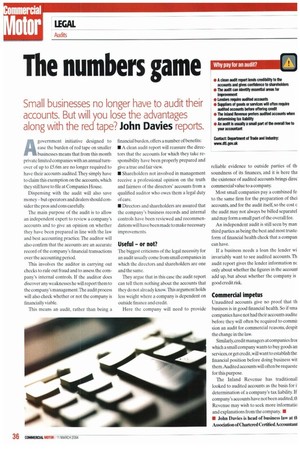The numbers game
Page 36

If you've noticed an error in this article please click here to report it so we can fix it.
Agovernment initiative designed to ease the burden of red tape on smaller businesses means that from this month private limited companies with an annual turnover of up to £5.6m are no longer required to have their accounts audited. They simply have to claim this exemption on the accounts, which they still have to file at Companies House.
Dispensing with the audit will also save money —but operators and dealers should consider the pros and cons carefully.
The main purpose of the audit is to allow an independent expert to review a company's accounts and to give an opinion on whether they have been prepared in line with the law and best accounting practice. The auditor will also confirm that the accounts are an accurate record of the company's financial transactions over the accounting period.
This involves the auditor in carrying out checks to rule out fraud and to assess the company's internal controls. If the auditor does discover any weaknesses he will report them to the company's management.The audit process will also check whether or not the company is financially viable.
This means an audit, rather than being a financial burden, offers a number of benefits: • A clean audit report will reassure the directors that the accounts for which they take responsibility have been properly prepared and give a true and fair view.
• Shareholders not involved in management receive a professional opinion on the truth and fairness of the directors' accounts from a qualified auditor who owes them a legal duty of care.
• Directors and shareholders are assured that the company's business records and internal controls have been reviewed and recommendations will have been made to make necessary improvements
Useful or not?
The biggest criticisms of the legal necessity for an audit usually come from small companies in which the directors and shareholders are one and the same.
They argue that in this case the audit report can tell them nothing about the accounts that they do not already know. This argument holds less weight where a company is dependent on outside finance and credit.
Here the company will need to provide reliable evidence to outside parties of thi soundness of its finances, and it is here tha the existence of audited accounts brings direc commercial value to a company.
Most small companies pay a combined fi to the same firm for the preparation of thei accounts, and for the audit itself, so the cost c the audit may not always be billed separatel and may form a small part of the overall fee.
An independent audit is still seen by man third parties as being the best and most truste, form of financial health check that a compan can have.
If a business needs a loan the lender wi invariably want to see audited accounts. Th audit report gives the lender information nc only about whether the figures in the account add up, but about whether the company is good credit risk.
Commercial impetus
Unaudited accounts give no proof that th business is in good financial health. So if sma companies have not had their accounts audite before they will often be required to commi: sion an audit for commercial reasons, despit the change in the law.
Similarly,credit managers at companies froi which a small company wants to buy goods an services, or get credit ,will want to establish the financial position before doing business wit them. Audited accounts will often be requeste for this purpose.
The Inland Revenue has traditionall looked to audited accounts as the basis for i determination of a company's tax liability. If company's accounts have not been audited,tb Revenue may wish to seek more informatio and explanations from the company. • • John Davies is head of business law at tt Association of Chartered Certified Accountant
































































































































































































